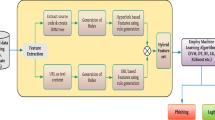Abstract
Increasing crime rate on online social networking sites is prominently observed in the last few years. Amount of information present and availability of various types of vulnerable people attract criminals on social networking sites. Criminals are misusing the facilities provided by social networks and create false identities which results in identity theft or masquerading, commonly known as clone profile attack and fake profile attack. These false identities are used to carry out numerous types of crimes and hence detection of such attacks is extremely important. Most of the proposed methods are targeting only clone profile attack detection and very few are detecting fake profiles attack. This article differentiates between fake profiles, clone profiles and cross-site cloning and proposes an integrated framework for fake profile and cross-site cloning detection. The proposed solution is integrating fake profile detection with profanity detector module and gender detection to improve the accuracy of fake profile detection. The article considers rich set of impactful features: attribute-based, network-based and user features, and a combination of pre-trained BERT and logistic regression techniques for detection of fake profile attack and cross-site cloning attack with achieved accuracy of 94.65% with precision 88.87% and recall 99.56%. Regression and boosting techniques are analyzed to check which is more impactful in terms of fake profile detection. With this proposed model through experimental analysis, the positive impact of profanity and gender detection on fake profiles detection is identified.






Similar content being viewed by others
References
Adewole KS, Han T, Wanqing W, Song H, Sangaiah AK (2020) Twitter spam account detection based on clustering and classification methods. J Supercomput 76(7):4802–4837
Aïmeur E, Sahnoune Z (2020) Privacy, trust, and manipulation in online relationships. J Technol Hum Serv 38(2):159–183
Alharbi A, Dong H, Yi X, Tari Z, Khalil I (2021b) Social media identity deception detection: a survey. ACM Comput Surv (CSUR) 54(3):1–35
Alharbi A, Hai D, Xun Y, Prabath A (2021a) Privacy-aware identity cloning detection based on deep forest. In: International conference on service-oriented computing, pp 415–430. Springer, Cham
Awan MJ, Khan MA, Ansari ZK, Yasin A, Shehzad HMF (2021) Fake profile recognition using big data analytics in social media platforms. Int J Comput Appl Technol 68:215–222
Bharti KK, Pandey S (2021) Fake account detection in twitter using logistic regression with particle swarm optimization. Soft Comput 25(16):11333–11345
Bilge L, Thorsten S, Davide B, Engin K (2009) All your contacts are belong to us: automated identity theft attacks on social networks. In: Proceedings of the 18th international conference on World Wide Web, pp 551–560
Can U, Alatas B (2019) A new direction in social network analysis: online social network analysis problems and applications. Phys A 535:122372
Conti M, Radha P, Marco S (2012) Fakebook: detecting fake profiles in on-line social networks. In: 2012 IEEE/ACM international conference on advances in social networks analysis and mining. IEEE, pp 1071–1078
Dumas TM, Ellis W, Litt DM (2020) What does adolescent substance use look like during the COVID-19 pandemic? Examining changes in frequency, social contexts, and pandemic-related predictors. J Adolesc Health 67(3):354–361
Elyusufi Y, Zakaria E (2019) Social networks fake profiles detection using machine learning algorithms. In: the proceedings of the third international conference on smart city applications. Springer, Cham, pp 30–40
Esposito C, Moscato V, Sperlí G (2021) Trustworthiness assessment of users in social reviewing systems. IEEE Trans Syst Man Cybern Syst 52(1):151–165
Fire M, Goldschmidt R, Elovici Y (2014) Online social networks: threats and solutions. IEEE Commun Surv Tutor 16(4):2019–2036
Ghoshal M (2021) Fake users and reviewers detection system. Turk J Comput Math Educ (TURCOMAT) 12(11):2090–2098
Gilmary R, Venkatesan A, Vaiyapuri G (2021) Discovering social bots on twitter: a thematic review. Int J Internet Technol Secur Trans 11(4):369–395
Jan TG, Khurana SS, Kumar M (2022) Semi-supervised labeling: a proposed methodology for labeling the twitter datasets. Multimed Tools Appl 81(6):7669–7683
Khaled S, Neamat E-T, Hoda MOM (2018) Detecting fake accounts on social media. In: 2018 IEEE international conference on big data (big data). IEEE, pp 3672–3681
Kondeti P, Lakshmi PY, Anita P, Gandharba S (2021) Fake account detection using machine learning. In: Evolutionary computing and mobile sustainable networks. Springer, Singapore, pp. 791–802
Kowalski RM, Limber SP, McCord A (2019) A developmental approach to cyberbullying: prevalence and protective factors. Aggress Violent Beh 45:20–32
Kumar N, Poonam D (2019) Detection and prevention of profile cloning in online social networks. In: 2019 5th international conference on signal processing, computing and control (ISPCC). IEEE, pp 287–291
Lee Y, Michelle NH, Jihoon K (2022) Gender differences in cyberbullying victimization from a developmental perspective: an examination of risk and protective factors. Crime Delinq. https://doi.org/10.1177/00111287221081025
Vyawahare M, Chatterjee M (2020a) Survey on detection and prediction techniques of drive-by download attack in OSN. In: advanced computing technologies and applications. Springer, Singapore, pp 453–463
Vyawahare M, Chatterjee M (2020b) Taxonomy of cyberbullying detection and prediction techniques in online social networks. In: data communication and networks. Springer, Singapore, pp 21–37
Mujeeb S, Sangeeta G (2022) Fake account detection in social media using big data analytics. In: proceedings of second international conference on advances in computer engineering and communication systems. Springer, Singapore, pp 587–596
Patel K, Sudhanshu A, Saijshree S (2020) Survey on fake profile detection on social sites by using machine learning algorithm. In: 2020 8th international conference on reliability, Infocom technologies and optimization (trends and future directions) (ICRITO). IEEE, pp 1236–1240
Punkamol D, Rangsipan M (2020) Detection of account cloning in online social networks. In: 2020 8th international electrical engineering congress (iEECON). IEEE, pp 1–4
Ramalingam D, Chinnaiah V (2018) Fake profile detection techniques in large-scale online social networks: a comprehensive review. Comput Electr Eng 65:165–177
Rao KS, Gutha S, Raju BD (2020) Detecting fake account on social media using machine learning algorithms. Int J Control Autom 13(1):95–100
Revathi S, Suriakala M (2018) Profile similarity communication matching approaches for detection of duplicate profiles in online social network. In: 2018 3rd international conference on computational systems and information technology for sustainable solutions (CSITSS). IEEE, pp 174–182
Roy PK, Chahar S (2020) Fake profile detection on social networking websites: a comprehensive review. IEEE Trans Artif Intell 1(3):271–285
Sahoo SR, Gupta BB (2021) Multiple features based approach for automatic fake news detection on social networks using deep learning. Appl Soft Comput 100:106983
Singh M, Amardeep S (2022) How safe you are on social networks? Cybern Syst 1–18
Singh N, Tushar S, Abha T, Tanupriya C (2018) Detection of fake profile in online social networks using machine learning. In: 2018 international conference on advances in computing and communication engineering (ICACCE). IEEE, pp 231–234
Singh V, Raju S, Saatvik A (2021) Preventing fake accounts on social media using face recognition based on convolutional neural network. In: sustainable communication networks and application. Springer, Singapore, pp 227–241
Smruthi M, Harini N (2019) A hybrid scheme for detecting fake accounts in facebook. Int J Recent Technol Eng (IJRTE) 7(5S3):213-217
Sowmya P, Chatterjee M (2020) Detection of fake and clone accounts in twitter using classification and distance measure algorithms. In: 2020 international conference on communication and signal processing (ICCSP). IEEE, pp 0067–0070
Swathi M, Ashley A, Bhawana R (2022) Fake profile detection and stalking prediction on facebook. In: soft computing: theories and applications. Springer, Singapore, pp 13–21
Van Der Walt E, Jan E (2018) Using machine learning to detect fake identities: bots vs humans. IEEE Access 6:6540–6549
Yurtseven İ, Bagriyanik S, Ayvaz S (2021) A review of spam detection in social media. In: 2021 6th international conference on computer science and engineering (UBMK). IEEE, pp 383–388
Author information
Authors and Affiliations
Contributions
Madhura Vyawahare: Conceptualization, Methodology, Design, Software, Field study, Writing-Original draft preparation. Dr. Sharvari Govilkar: Data validation, Investigation, Visualization and representation validation, Writing-Reviewing and Editing.
Corresponding author
Ethics declarations
Conflict of interest
We hereby declare that we have no pecuniary or other personal interest, direct or indirect, in any matter that raises or may raise a conflict with our duties as authors.
Additional information
Publisher's Note
Springer Nature remains neutral with regard to jurisdictional claims in published maps and institutional affiliations.
Rights and permissions
Springer Nature or its licensor (e.g. a society or other partner) holds exclusive rights to this article under a publishing agreement with the author(s) or other rightsholder(s); author self-archiving of the accepted manuscript version of this article is solely governed by the terms of such publishing agreement and applicable law.
About this article
Cite this article
Vyawahare, M., Govilkar, S. Fake profile recognition using profanity and gender identification on online social networks. Soc. Netw. Anal. Min. 12, 170 (2022). https://doi.org/10.1007/s13278-022-00997-3
Received:
Revised:
Accepted:
Published:
DOI: https://doi.org/10.1007/s13278-022-00997-3




